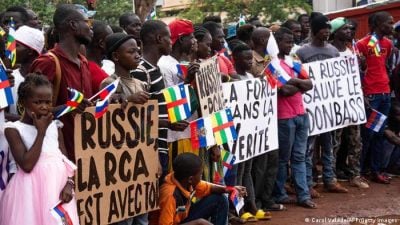Russia-Africa Relations, Against Neo-Colonialism?

When sixteen African states abstained and one (Eritrea) voted against the UN General Assembly resolution condemning Russia over the war in Ukraine – the Western World pretended to ignore it. “So what, they abstained because probably do not even know where Ukraine is” – disparaging remarks appeared. But the position of South Africa, Congo, Sudan, Uganda, Zimbabwe, Tanzania, Mozambique, Namibia, South Sudan, Central African Republic, Senegal, Madagascar, Mali, Equatorial Guinea, Burundi and Algeria was by no means accidental. On the contrary, it is an evident geostrategic calculation, significantly influencing the global balance of power and related to Russia’s growing economic and political presence in Africa.
Against Neo-colonialism
The return of Russians to Africa is easier because of the still alive and positive memory of the Soviet help for decolonisation processes and building the foundations for economic independence there. Today, the Russians also offer their mutually beneficial support, primarily within the range of the energy transformation, the most important issue of our times. After decades of Western neo-imperialism and the disastrous experiences of e.g. cooperation with Americans in the oil sector (especially in Nigeria), African states are now turning primarily towards Beijing. China acts as a less strict lender, offering loans without condition to adopt its own political system, but also as a flexible investor and a huge market, especially for energy. Between 2000 and 2014 Angola, Ethiopia, Sudan, Kenya and DRC received $49.2 billion of Chinese loans. At the same time, Russia proposes a technological alternative to Western expansion, whether it is aimed at deposits of rare earth elements (CAR, Congo, Mozambique), or at the cos(t)mical projects of transforming the entire Sahara into one big photovoltaic farm (southern Algeria, northern Mali, Sudan). The Moscow offer is simpler and briefly called: ROSATOM.
The Race of Technology and Politics
Yes, Russian energy policy is not only about gas and oil, although ROSNEFT is also successfully dealing with African markets (Equatorial Guinea, South Sudan, Mozambique, Nigeria and Libya). The $76 billion contract with South Africa, emblematic for Russian nuclear expansion, was blocked in 2017 in effect of the Western competitors’ hysterical attacks, launching all their South African political assets. But there is a chance for it at least partly revival, what was not excluded by the President Cyril Ramaphosa.
During these few years, ROSATOM has learned a lot and today the Russians do not operate in Africa without an active soft power. Significant example was the Russia-Africa Summit, organised in Sochi in 2019, which was the unquestionable success of Vladimir Putin, but also pure facts speak, as the cancellation of $20 billion African countries debts from the Soviet era. In effect ROSATOM builds i.a. a power plant in Egypt for $29 billion, the investment in Zambia is worth $10 billion and Russians are present in Uganda, Rwanda, Ethiopia, Nigeria etc. The Russian offer is perfectly formatted for the needs of smaller (albeit a relative) African states and the local dispersed energy market, an excellent example of which is the 1,000 MW nuclear power plant for Ghana worth $4.2 billion.
Nuclear Energy
Paradoxically, Western countries, as UK loudly announced cutting themselves off from Russian gas thanks to nuclear technology, especially SMR (small modular reactors), which are still mostly a promise costing taxpayers hundreds of million grants for private investors and their research programs, with another £120 million for Rolls-Royce in the UK as an infamous example. Meanwhile, the Russians already have such technology (small RITM-200 reactors), adapting it from their nuclear icebreakers for the electrification of Africa. Let’s be serious: how would the West cope in the nuclear race with a country that accounts for 8% of global uranium production, 20% of its coversion and 43% of enrichment?
Is Socialism Still Alive in Russia-Africa-China Relations?
And yet nuclear and oil are not everything, there are also Russian investments in diamond mining (ALROSA in Angola and Zimbabwe). There is a Russian arms trade with Nigeria, Egypt and 28 other African countries worth at least $12 billion.
It is also the presence of Russian private military agencies in 19 African countries. Just before the pandemic, 2018-2019, trade between Russia and Africa increased by 17% to $20 billion and is now rising rapidly to jump this threshold.
Meanwhile, subordinated to the US Western Europe dreams about the assumed energy goals, i.e. deepening dependence on American LNG. And all of it is supposed to be achieved thanks to the further neo-colonial energy exploitation of Africa! When thousands of African students attend again Russian universities… Do we need better proof of the blindness and arrogance of the colonisers’ descendants?
Because although tactically Moscow announced “the decline of Leninism” in her policy for the close neighbourhood – the World struggle against Western imperialism nonetheless prevails. Moreover, on the continent, where only 43% residents have constant access to energy other than biomass burning – the words about changing the (geo)political system with electrification are not just a forgotten slogan.
*
Note to readers: Please click the share buttons above or below. Follow us on Instagram, Twitter and Facebook. Feel free to repost and share widely Global Research articles.
Konrad Rękas is a renowned geopolitical analyst and a regular contributor to Global Research.
Featured image: Central African Republic solidarity demonstration with Russia


